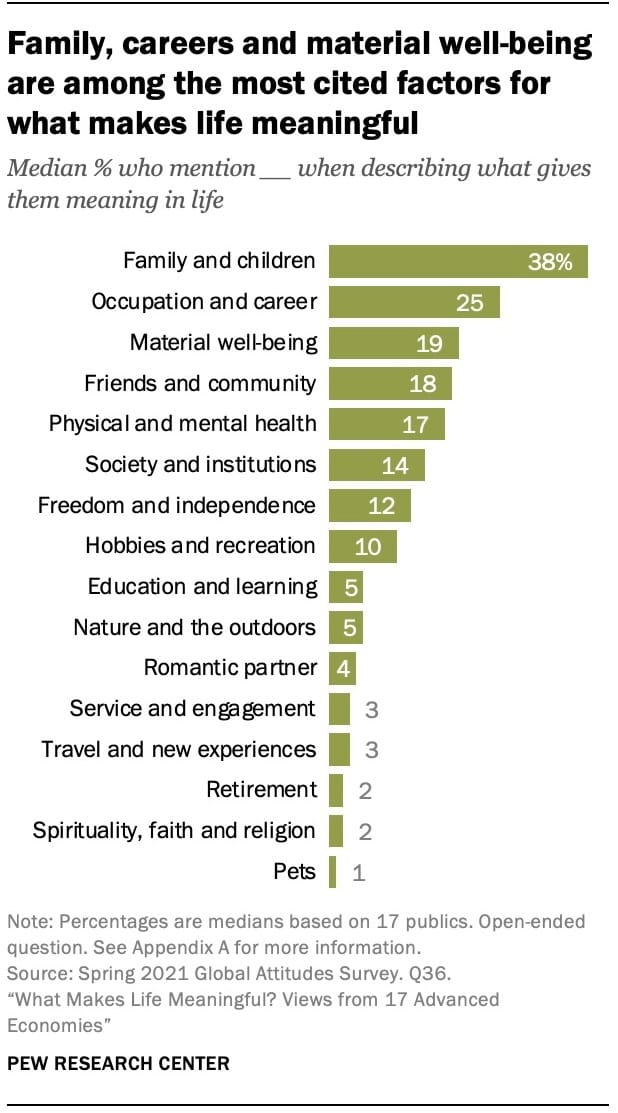
What Makes Life Meaningful?
One of the most pressing questions for humans to answer in any period is what makes life meaningful. Throughout time, the answers people give often reflect the cultural values of the time but also reveal some of the values passed down regardless of the people in power or the dominant cultural trend.
The ancient Chinese cultures, under the influence of Confucianism and Taoism, pursued harmony with nature and a deep respect for family and the surrounding community.
The Greeks pursued virtue and knowledge. Socrates encapsulated this idea by saying, "The unexamined life is not worth living."
The Romans emphasized honor and duty.
America is known to have been founded to celebrate individualism and freedom. The "American Dream" seems the pinnacle of a meaningful life: each might ascribe to their philosophy of what makes life good and meaningful.
In an age where the United States dominates world culture, this freedom to decide for oneself what makes life meaningful has led to a plethora of ideas on the good life. We see so represented in data, and Pew Research has given insight into what modern cultural groups are now revealing about their belief on what is meaningful1.
What Makes Your Life Most Meaningful?
The Top Three Sources of Meaning:
The answers range, but the top two are separate from the rest. Family is the runaway favorite for providing meaning in life, followed by occupation. Third place by a close margin is material well-being. Considering the current cultural conversation surrounding these three topics, this proves to be an exciting trio. Though people claim them as providing meaning, all three come with controversy.

Family
In a culture where marriage has come under attack and children are becoming increasingly scarce, as a husband and father of two boys I find it fantastic that family remains in the top spot for what provides meaning for people worldwide.
Though the war on family is loud, it is unsurprising that it has held steadfast. The intimate communion of the family fits a need for a community, as few other structures in society do. It is a point of touch, sharing space, speaking, friendship, and service that all prove essential to human functioning.
And the stats don't lie. Those married and those with children both report having happier lives and living longer2 3
Being number one, this proves that you must be careful when choosing your partner. It is not a decision to make lightly, but who you choose to live with often provides meaning or robs you of a great source of happiness.
Occupation
It seems like contrarian data that 25 percent of people cite experiencing the most meaning from their jobs, and yet, in America, many people hate their jobs4.
It proves the point, however, just how important choosing your job is. What you do daily can prove to be something that gives you meaning or takes it away.
Material Well-Being
As far as cultural conversation goes, this one makes the most sense. I hear adnauseum that people want more material possessions. Money, clothes, cars, and homes will all make us a little happier, and we find meaning in pursuing and attaining these things.
And yet, I also find this the most discouraging. Things come and go. Rust and moth destroy. The market is up and down. Is there no more excellent intangible source of meaning to pursue than how fat your wallet is or the car in your driveway?
Regardless, there is something to be said for security. Knowing there will be food on the table, a roof over our heads, and that the bills will be paid provides an important peace that should not be discounted.
It is often when you don't have enough that having enough means a lot!
Spirituality Coming in (Almost) Last??
Perhaps the most significant interest is that spirituality ranked so low in what provided meaning to people. While I am glad people find purpose in their family and their jobs and even in the good gifts we have in life. Indeed, religion and spirituality draw all of life together and are the very definition of our purpose…
Right?
In my experience, it is my conviction that I have faith that defines for me why my marriage has meaning. There is a reason people today view marriage as nothing more than an artifact of older times, something done for the government.
Marriage is a sacred contract only when held in God's eyes.
In my experience, my occupation holds little purpose if it is simply temporal. The reality is that, in most jobs, if you were to leave today, they would have someone hired in a week and trained in a month. In most jobs, you are replaceable. Even in most cases where you provide a good or service and it is your business, if you were to retire and no longer offer it, someone else in the broader economy would.
So, the reason your job has meaning outside of faith is not for others but for you. But the person of faith views their job as sacred, part of a divine economy, a mystery that connects you with a more profound purpose.
Spirituality also changes our relationship with material goods, realizing that material things are temporal. There is something eternal about life that can be experienced now.
Conclusion
We all want to be happy. We all want meaning and purpose. Some have specific ideas of what provides that happiness; for others, it is a general perception of well-being. Regardless, we all want peace, love (and little doughnuts?).
What provides you meaning, and how do you go about pursuing it? Feel free to respond to this email or answer the poll above. I'd love to interact with your thoughts on this!
